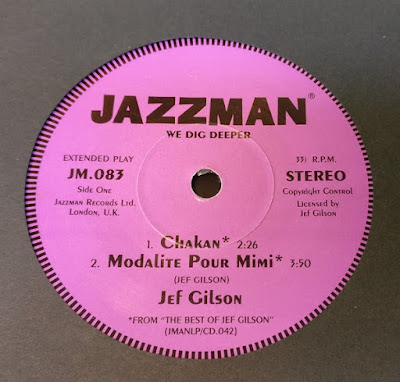Jean-François Quiévreux (25 July 1926 – 5 February 2012), better known as Jef Gilson, was a French clarinetist, pianist, arranger, vocalist, composer and big band leader who played in a straight-ahead hard bop style and also made forays into Afro-jazz and free jazz.
Gilson was born Jean-François Quiévreux in the Alsatian town of Guebwiller, in northeastern France. When Jean-François was 11, his father, a mining engineer and music enthusiast, uprooted the family to Paris after a work-related injury forced him to transfer into an office job. As a youth he claimed to have switched from playing piano to clarinet to fool his parents into thinking he was studying classical music and not jazz. Yet as a teenager living in the severe backdrop of Nazi-occupied France, Jean-François was already organizing secret jazz gigs in Paris with celebrated musician Claude Luter and trumpeter/novelist Boris Vian.
fter the war, Gilson threw himself back into mastering the piano. As an admirer of both Canadian cool jazz pioneer Gil Evans and bebop arranger Walter “Gil” Fuller, he took on the moniker of Gilson—“Gil’s son.” Heavily influenced by the Dizzy Gillespie Big Band, the young maestro was entranced by the forward-thinking sounds of bebop. It was a bold direction to take, as French jazz audiences were still feeling the more traditional New Orleans style. But Gilson, setting the tone for his entire career, opted to follow his own sonic interests.
For this and other reasons, major success never quite crystallized for Gilson. By the 1950s, he’d started to lay down his compositions on wax but was also taking shifts in record stores and freelance jobs as a sound engineer to pay the bills. Gilson served behind the boards at Charles Delaunay’s Vogue label from its foundation in the early 1950s and for a period even ran his own record shop, Kiosque d’Orphée, on the rue des Beaux-Arts. In the back room, the musician built his own studio, recording French musicians like his old friend Vian and a young American named Lloyd Miller, who’s hailed these days for his research on Persian and Afghan music.
Gilson enjoyed a diamond reputation among local jazzmen. His collaboration list reads like the record collection of any serious French jazz music collector: Henri-Claude Fantapié, Jean-Louis Chautemps, Eddy Louiss, Michel Portal, Jean-Luc Ponty, Bernard Lubat, Mino Cinelu, Henri Texier, Alby Cullaz, Jacques Di Donato, François Jeanneau, and others.
His role as a key touching point for visiting American musicians and expatriates in Paris also saw him mix with legends like Bud Powell, Woody Shaw, Bill Coleman, Byard Lancaster, Nathan Davis, Philly Joe Jones, Ted Curson, Hal Singer, Butch Morris, Wayne Shorter, Ornette Coleman, Dizzy Gillespie, and John Coltrane. A career highlight came at the Festival d’Antibes, Juan Les Pins in 1965 when Gilson opened for Coltrane.
Gilson took an interest in the early development of free jazz. His recordings, on which early compositions with tempo changes (such as Enfin!), bitonal layers and chromatic topics are included, first appeared on a mini label. Some of the harmonic function has been overridden in his compositions since 1964, without, being exclusively free jazz oriented (New Call from France, 1966). Commercial success did not materialize. In addition, in 1965 he joined the vocal sextet Les Double Six, first as and a member, later as its musical director, which he left in 1968 to teach music in Madagascar.
In 1971 he returned and concentrated first on ethno jazz and later "total improvisation". In 1973 he founded his label, Palm, on which are especially the recordings with his orchestra Europamerica, and with Butch Morris. For this more arranged record, which started reflecting his achievements of free jazz, he was awarded the 1978 Prix Boris Vian. He also established a jazz school in Paris.
In the 1980’s he ceased to perform while continuing to teach and became more important for helping the careers of other younger musicians than for his own playing. Up to his final days he lived withdrawn in Ardèche. Gilson lived only to see the first shots of a surge of interest in his work before passing away on February 5, 2012.
(Edited from article by Dean Van Nguyen @ Bandcamp Daily, New Grove Dictonary of Jazz & Wikipedia)







